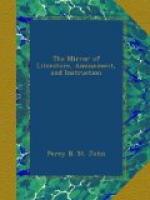Jones’s History of Wales.
ITALIAN WOMEN.
Italy and England are undoubtedly possessed of a greater share of female beauty than any other country in Europe. But the English and Italian beauties, although both interesting, are very different from one another. The former are unrivalled for the delicacy and bloom of their complexions, the smoothness and mild expression of their features, their modest carriage, and the cleanliness of their persons and dress; these are qualities which strike every foreigner at his landing. On my first arrival in England, I was asked by a friend how I liked the English women; to which I replied that I thought them all handsome. This is the first impression they produce. There is an air of calmness and pensiveness about them, which surprises and interests particularly a native of the south. They seem to look, if I may apply to them the fine lines of one of their living poets—
“With eyes so pure, that from the
ray
Dark vice would turn abash’d away;
* * * * *
Yet fill’d with all youth’s
sweet desires,
Mingling the meek and vestal fires
Of other worlds, with all the bliss
The fond weak tenderness of this.”
The Italian beauties are of a different kind. Their features are more regular, more animated; their complexions bear the marks of a warmer sun, and their eyes seem to participate of its fires; their carriage is graceful and noble; they have generally good figures; they are not indeed angelic forms, but they are earthly Venuses. It has been supposed by some, that the habitual view of those models of ideal beauty, the Greek statues, with which Italy abounds, may be an indirect cause conducing to the general beauty of the sex; be that as it may, I think the fine features and beautiful forms of the Italian fair have a great influence upon the minds of young artists, and this is perhaps one of the principal reasons why Italy has so long excelled in figure painters. A handsome female countenance, animated by the expression of the soul, is among the finest works of nature; the sight of it elevates the mind, and kindles the sparks of genius. Raphael took the models of his charming Madonnas from nature. Titian, Guido, Caracci, and others, derived their ideas of female beauty from the exquisite countenances so frequent in their native country.
Italy in the Nineteenth Century.
* * * * *
MY COMMON-PLACE BOOK.
No. XXII.
* * * * *




